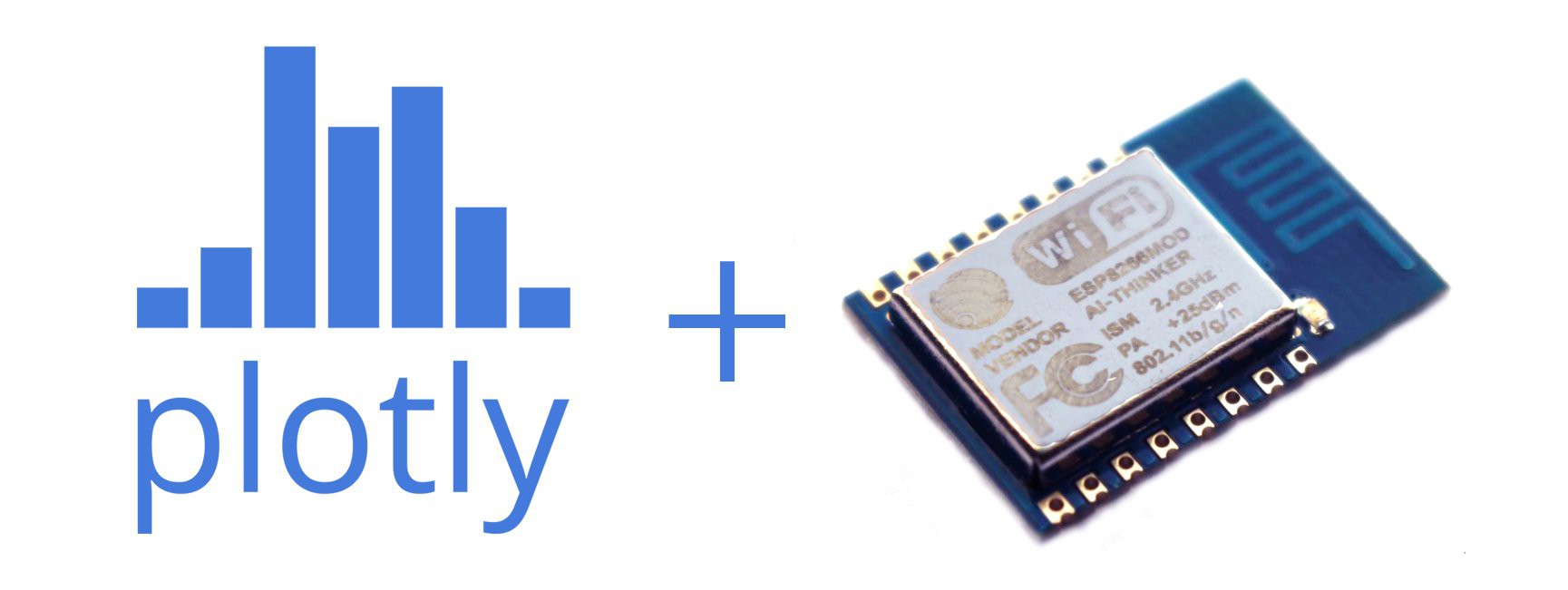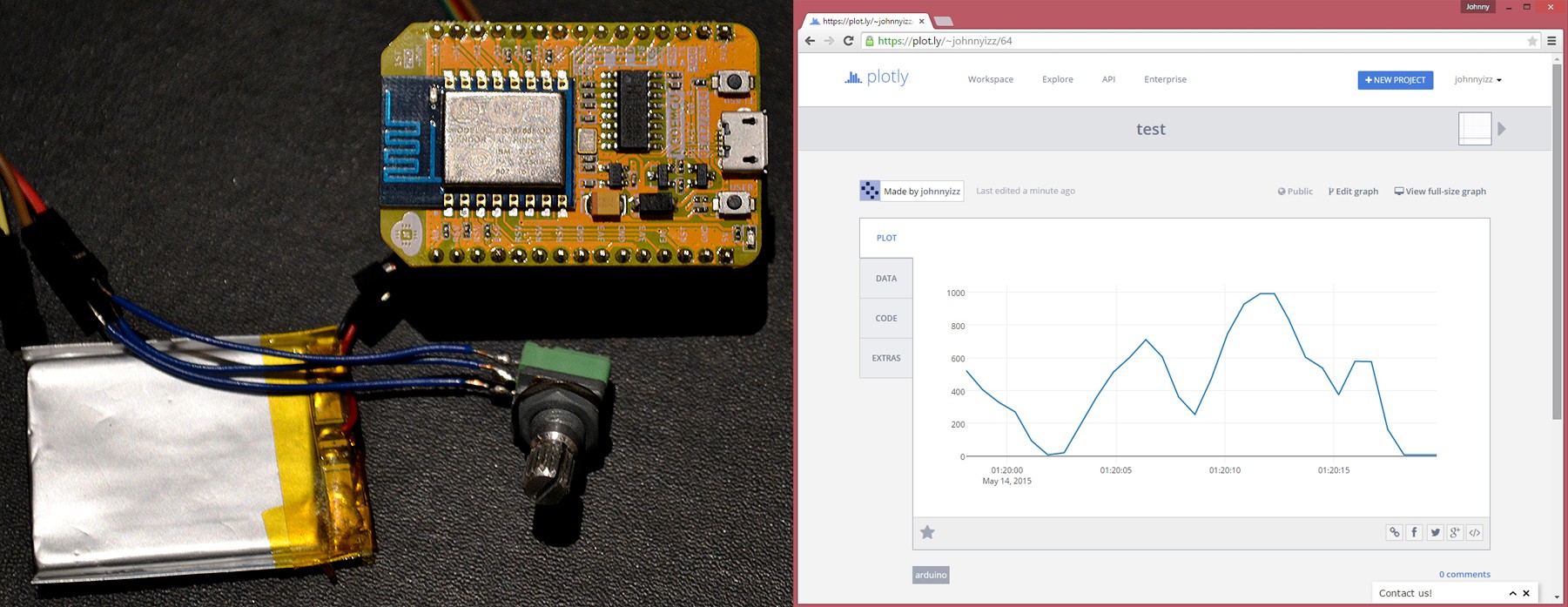
For this project I'm using the nodeMCU development kit (NodeMCU devKit Github) to develope my code. The development kit contains a ESP8266 WiFi module, and I'm using this to wirelessly send data to the plotly streaming server. Plotly is a online browser based tool for visualizing data, which also has a streaming feature for displaying your data in real-time. Plotly is great because any device that has a browser and is connected to the internet (smartphone, PC, tablet, etc) can see the real-time data.

The nodeMCU devkit contains a ESP8266-12 WiFi module, a 3.3V regulator, two buttons (flash and user) and a USB to Serial converter. I purchased my board from aliexpress for around $6US. I chose to use this board because it contains all that is needed to develop with the ESP8266.
I have erased the nodeMCU firmware and downloaded my custom Arduino code using the Arduino IDE 1.6.5 and the ESP8266 Board Package installed (Arduino-Compatible IDE for ESP8266 Github page).
The Arduino Code
The Arduino code:
#include <ESP8266WiFi.h>
#define ssid "YourSSID"
#define pass "YourWiFiPassword"
#define userName "YourPlotlyUserName"
#define APIKey "xxxxxxxxxx"
#define fileName "test"
#define fileopt "overwrite"
#define nTraces 1
#define maxpoints "30"
#define world_readable true
#define convertTimestamp true
#define timezone "Australia/Melbourne"
char *tokens[nTraces] = {"xxxxxxxxxx"};
char stream_site[25] = {0};
WiFiClient client;
/* -------------- Setup ------------------ */
void setup() {
// Setup Serial
Serial.begin(9600);
delay(2000);
Serial.println();
Serial.println();
ESP8266_Init();
ESP8266_Connect("plot.ly", 80);
Serial.println("Initializing plot with Plot.ly server...");
plotly_init();
Serial.println("Making sure disconnected...");
client.stop();
Serial.println("Done!");
ESP8266_Connect("arduino.plot.ly", 80);
}
/* ------------- Loop -------------------- */
void loop() {
int val = analogRead(A0);
plotly_plot(millis(),val,tokens[0]);
}
/* --------------- Functions -------------------- */
void ESP8266_Init(){
Serial.println("-------------------------------------");
Serial.println(" INITIALIZING...");
Serial.println("-------------------------------------\r\n");
// Put WiFi into Station mode
Serial.println("1. Putting WiFi into station mode...");
WiFi.mode(WIFI_STA);
Serial.println(" Done!\r\n");
// Connect to WiFi
Serial.print("2. Connecting to: \"");
Serial.print(ssid);
Serial.print("\",\"");
Serial.print(pass);
Serial.println("\"...");
WiFi.begin(ssid, pass);
while (WiFi.status() != WL_CONNECTED) {
delay(500);
Serial.print(".");
}
Serial.println();
Serial.println(" WiFi connected!");
Serial.print(" IP address: ");
Serial.println(WiFi.localIP());
Serial.println();
Serial.println("-------------------------------------");
Serial.println(" INITIALIZATION COMPLETE!");
Serial.println("-------------------------------------\r\n");
}
void ESP8266_Connect(char* url, int port){
Serial.print("Connecting to: \"");
Serial.print(url);
Serial.println("\" server...");
if (!client.connect(url, port)) {
Serial.println("*Connection Failed!*\r\n");
while(1){};
}
else{Serial.println("Connected!");}
}
void plotly_init(){
unsigned int i = 0;
char charbuffer;
// Calculate content length
unsigned int contentLength = 126 + strlen(userName) + strlen(fileopt) + nTraces*(87+strlen(maxpoints)) + (nTraces - 1)*2 + strlen(fileName);
if(world_readable){
contentLength += 4;
}
else{
contentLength += 5;
}
String contentLengthString = String(contentLength);
const char* contentLengthConstString = contentLengthString.c_str();
unsigned int postLength = contentLength + 94 + strlen(contentLengthConstString);
// Send Post and initalization data
client.print(
String("POST /clientresp HTTP/1.1\r\n") +
"Host: plot.ly:80\r\n" +
"User-Agent: Arduino/0.6.0\r\n" +
"Content-Type: application/x-www-form-urlencoded\r\n" +
"Content-Length: " + String(contentLength) + "\r\n\r\n" +
"version=2.3&origin=plot&platform=arduino&un=" + userName +
"&key=" + APIKey + "&args=["
);
for(int i=0; i<nTraces; i++){
client.print(
String("{\"y\": [], \"x\": [], \"type\": \"scatter\", \"stream\": {\"token\": \"") +
String(tokens[i]) +
"\", \"maxpoints\": " +
String(maxpoints) +
"}}"
);
if(nTraces > 1 && i != nTraces-1){
client .print(", ");
}
}
client.print(
String("]&kwargs={\"fileopt\": \"") + fileopt +
"\", \"filename\": \"" + fileName +
"\", \"world_readable\": "
);
if(world_readable){
client.print("true}");
}
else{
client.print("false}");
}
// Look for "~" in server response to see web address, the next '"' is the end
if(client.find("~")){
i=0;
while(1){
while(!client.available()){}
charbuffer = client.read();
if(charbuffer == '\"'){break;}
stream_site[i] = charbuffer;
i++;
}
Serial.println("Successfully Initialized.");
Serial.print("Please visit: \"http://plot.ly/~");
i=0;
while(stream_site[i]){
Serial.print(stream_site[i]);
i++;
}
Serial.println("\".");
}
else{
Serial.println("*ERROR!*");
while(1){}
}
}
void plotly_plot(unsigned long x, int y, char *token){
String xString = String(x);
String yString = String(y);
const char* xConstString = xString.c_str();
const char* yConstString = yString.c_str();
unsigned int jasonLength = 44 + strlen(xConstString) + strlen(yConstString);
String jasonLengthString = String(jasonLength, HEX);
const char* ConstJasonLengthString = jasonLengthString.c_str();
unsigned int postLength = 167 + strlen(ConstJasonLengthString) + jasonLength;
//Serial.print("Data sending... ");
client.print(
String("POST / HTTP/1.1\r\n") +
"Host: arduino.plot.ly\r\n" +
"User-Agent: Arduino\r\n" +
"Transfer-Encoding: chunked\r\n" +
"Connection: close\r\n" +
"plotly-convertTimestamp: \"Australia/Melbourne\"\r\n\r\n" +
jasonLengthString +
"\r\n{\"x\": " + xString + ", \"y\": " + yString + ", \"streamtoken\": \"" + token + "\"}\n\r\n" + "0\r\n\r\n");
Serial.println("Data Sent!");
}
 Johnny
Johnny